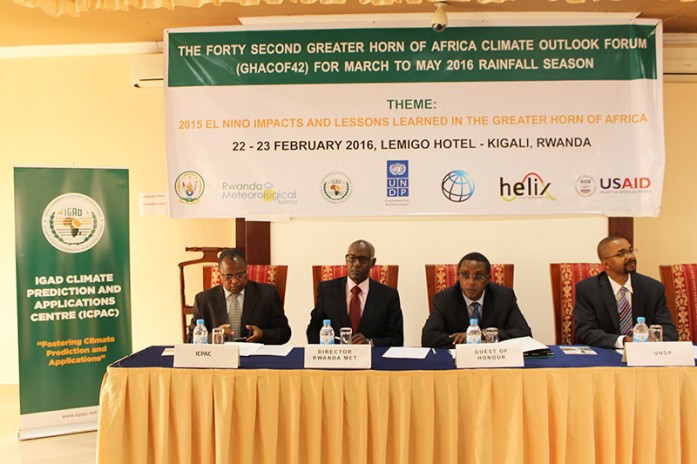
Since 1997, an innovate process referred to as the Regional Climate Outlook forum (RCOF) has been in existence in different parts of the world. RCOFs are organized within the framework of the World Meteorological Organization (WMO) in collaboration with National Meteorological and Hydrological Services (NMHSs), regional/ international
climate centres, and other partners. The aim of the RCOFs is to provide consensus regional seasonal climate outlooks to reduce climate related risks for sustainable development.
The Regional Centre for Mapping of Resources for Development (RCMRD) is taking part in the forty second Greater Horn of Africa Climate Outlook Forum (GHACOF 42) being held in Kigali, Rwanda from 22-23rd February, 2016. The forum is being held within the framework of the Intergovernmental Authority on Development (IGAD) regional plan for mainstreaming climate information in the main socio-economic areas so as to support disaster risk reduction for sustainable development. The forum’s theme is “2015 El Niño impacts and lessons learned in the Greater Horn of Africa”. This is closely linked to activities within the SERVIR Programme that deal with disasters associated with the climate and are widespread in the Greater Horn of Africa (GHA).
In his opening address, Hon. Vincent Biruta, the Minister for Natural Resources (MINIRENA), Rwanda, and member of RCMRD Ministerial Council noted that climate change was likely to lead to an increase in frequency, magnitude, and severity of adverse impacts of extreme weather and climate events such as drought, floods, sea level rise, and storm surges. The Intergovernmental Panel on Climate Change (IPCC) has noted the GHA region to be one of the most vulnerable regions to climate change in the world. In this regard, there is need for strong climate advisories like those provided by GHACOFs. The GHACOF products can be used for disaster risk reduction and climate change adaptation to enhance the resilience of communities.














